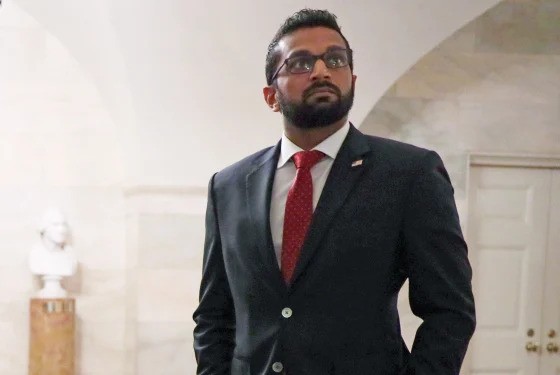Kash Patel’s Vision for the FBI: A Deep Dive into Proposed Reforms
Kash Patel, a former senior national security official under President Donald Trump, has emerged as a controversial figure in discussions about the future of the Federal Bureau of Investigation (FBI). Patel’s ideas for reforming the FBI have sparked debates over the direction of law enforcement and national security in the United States. Here’s an in-depth look at his proposals and the potential implications should he take the helm as FBI Director.
**Proposals for Change:**
1. **Shrinking the FBI’s Footprint:**
Patel has expressed a desire to drastically reduce the FBI’s operational size, particularly its headquarters in Washington, D.C. He has suggested, “I’d shut down the FBI Hoover building on day one and reopen it as a museum of the Deep State”. This move would symbolize a significant reduction in the bureaucratic overhead of the FBI, potentially decentralizing its operations to regional offices across the country. The idea is that a leaner FBI would focus more on street-level law enforcement and less on what critics call the “Deep State” operations.[](https://x.com/GuntherEagleman/status/1863018850607841513)[](https://x.com/Chicago1Ray/status/1856765805809291404)
2. **Transparency and Accountability:**
Patel has advocated for greater transparency within the FBI, proposing the establishment of a “24/7 declassification office” to ensure that information is not used to cover up corruption. He has also floated the idea of giving the public access to historically significant files like those related to JFK and 9/11, aiming to foster trust by demystifying government activities.[](https://www.timesnownews.com/world/us/us-news/kash-patel-to-replace-fbi-director-christopher-wray-steve-bannons-new-trump-cabinet-claim-article-115278154)[](https://x.com/nicksortor/status/1863012977718239541)
3. **Personnel Overhaul:**
A major theme in Patel’s reform agenda is a comprehensive “housecleaning” of the FBI. He has suggested firing the top echelons of the bureau and prosecuting those he believes have abused their authority for political ends. This would involve not only removing current leadership but also potentially restructuring how agents are selected and promoted to avoid political biases.[](https://abcnews.go.com/amp/US/fierce-trump-ally-kash-patel-reshape-fbi-justice/story?id=115660992)[](https://newrepublic.com/post/188515/kash-patel-trump-fbi-pick-loyalist)[](https://www.theguardian.com/us-news/2024/nov/19/trump-kash-patel-fbi-director)
4. **Fighting the “Deep State”:**
Patel’s rhetoric often targets what he refers to as the “Deep State,” a term used by some to describe entrenched government officials who allegedly work against elected leaders. His approach includes rooting out those he perceives as part of this group, thereby shifting the FBI’s culture from what he sees as an insider’s club to a more accountable entity to the public and the President.[](https://www.forbes.com/sites/alisondurkee/2024/11/30/trump-picks-kash-patel-to-run–fbi-and-heres-why-critics-are-worried/)
**Potential Implications:**
– **Operational Impact:**
– If implemented, Patel’s ideas could lead to a more decentralized FBI, potentially affecting response times and coordination in national security matters. While regional focus might enhance community policing, it could also weaken the FBI’s ability to conduct large-scale, centralized investigations.
– **Morale and Recruitment:**
– Such sweeping changes might lead to significant morale issues within the bureau. The FBI has a long history and culture, and a radical shift could cause experienced agents to leave, impacting both current operations and the cultivation of expertise for future challenges. Recruitment might also be affected if potential candidates view the FBI as overly politicized.
– **Legal and Political Challenges:**
– Patel’s promises to prosecute officials for political bias could face significant legal hurdles, not to mention the political fallout. This approach might be seen as a witch hunt by critics, further polarizing political discourse around law enforcement.
– **Public Perception:**
– While some might welcome the transparency and accountability, others could view these reforms as an attack on the integrity of the FBI. The agency’s public image could suffer if the reforms are perceived as an attempt to weaponize the FBI for political gain.
– **National Security:**
– The FBI’s role in counterterrorism, cybercrime, and foreign intelligence might be compromised if there’s a significant reduction in resources or disruption in leadership. Critics argue that such reforms could leave the nation more vulnerable at a time when threats are evolving.
Kash Patel’s vision for the FBI reflects a broader ideological battle within American politics about the role of federal agencies, their independence, and their accountability to elected officials. If appointed, his tenure as FBI Director would likely be marked by attempts to realign the bureau’s priorities towards what he and his supporters view as the core mission of the FBI, with potential ripple effects across law enforcement and national security landscapes. However, these changes would not come without resistance from within the agency, from Congress, and from the broader public, given the FBI’s storied history and its pivotal role in American governance.
Article written with the assitance of Grok AI, only on X.com
